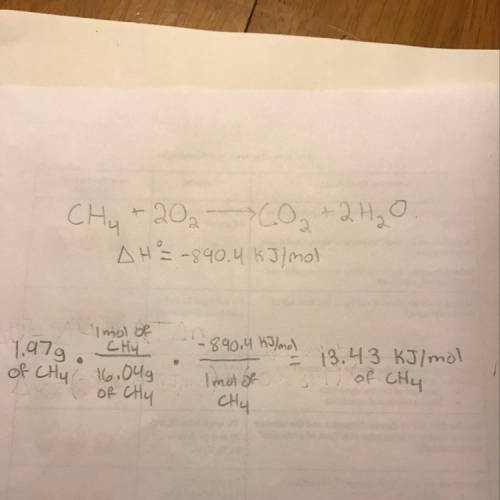
Chemistry, 14.07.2019 17:50 gabbym39077
For the complete combustion of 1.000 mole of methane gas at 298 k and 1 atm pressure, δh° = -890.4 kj/mol. what will be the amount of heat released when 1.97 g of methane is combusted under these conditions?

Answers: 1


Another question on Chemistry

Chemistry, 22.06.2019 04:00
Mitosis is a type of cell division that produces cells that are identical to the parent cell. meiosis is a different type of cell division that produces cells that carry have a genetic material of the parent cell. based on the information provided how do the purpose of mitosis and meiosis differ
Answers: 3

Chemistry, 22.06.2019 06:20
If i can still dissolve more sugar into the solution at a certain temperature what would i call that solution
Answers: 3

Chemistry, 22.06.2019 10:00
Ill give brainiestif one neutron initiates a fission event that produces two neutrons in the products, how many new reactions can now be initiated? if each of the neutrons produced in the first fission event then initiates a fission event that produces one neutron in the products, how many new reactions can now be initiated by each neutron? how many neutrons in total were produced by the two fission events described?
Answers: 2

Chemistry, 22.06.2019 11:00
Imagine that twenty i.u.’s of enzyme z were catalyzing the above reaction for one minute, under vmaxconditions, in a 3.00 ml assay volume. the assay is buffered with 20 mm phosphate buffer, ph 7.60. what will the ph be at the end of that one minute?
Answers: 2
You know the right answer?
For the complete combustion of 1.000 mole of methane gas at 298 k and 1 atm pressure, δh° = -890.4 k...
Questions



Mathematics, 17.03.2020 02:23





Mathematics, 17.03.2020 02:23



Mathematics, 17.03.2020 02:24


Mathematics, 17.03.2020 02:24

Mathematics, 17.03.2020 02:24

Mathematics, 17.03.2020 02:24


History, 17.03.2020 02:24






